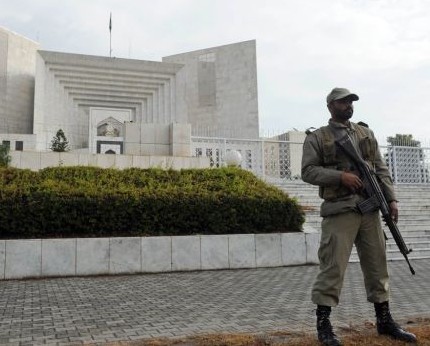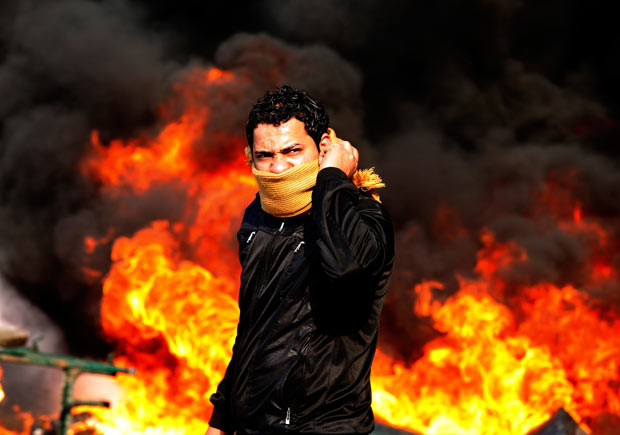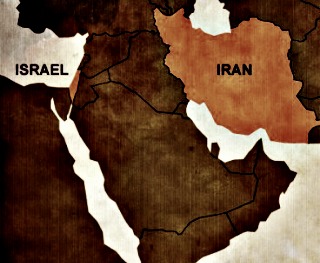By: Alexander Corbeil
The land of coups, nuclear warheads, and Islamic extremists has born witness to a tense standoff between the country’s three political powerhouses. President Asif Ali Zardari and his Pakistan Peoples Party (PPP) are currently in a struggle with both the Supreme Court and top military brass of the country. In the shadows lurkPakistan’s opposition parties that have taken full advantage of the current instability to push for early elections for the lower house of parliament.
The most recent crisis began with an op-ed in the Financial Times on 10 October of last year. The author Mansoor Ijaz, an American businessman with Pakistani connections, stated that he delivered a secret memorandum from the Pakistani government to Admiral Michael Mullen, then the Chairman of the Joint Chiefs of Staff. In the memo, the civilian government ofPakistan requested the assistance of theUS in helping to stop what Zaradari believed was an impending military coup. The President feared that in the aftermath of theUS raid which killed Osama bin Laden, the infuriated military, embarrassed by its inability to stop the operation, would turn around and overthrow the civilian leadership. In return forUS assistance, the memo stated that the civilian government would implement key American demands regarding internal Pakistani politics. This included giving the US military a green light to conduct operations against al-Qaeda on Pakistani soil, improve the safety and security of the country’s nuclear program, and reign in non-state actors threatening India and the US.
The most startling part of the memo was Zardari’s willingness to dismantle part of the Inter-Services Intelligence, specifically Section S, which has long been accused of having ties to both the Afghan and Pakistani Taliban. With Ijaz pointing to the Pakistani Ambassador to theUnited States, Hussain Haqqani, as the memo’s author, a political crisis exploded. On 22 November, five days after the ambassador was exposed by Ijaz, he resigned from his post while denying allegations that he had authored the memo.
The PPP, Supreme Court, and the Military
The Supreme Court is now taking on the PPP on two fronts in an unprecedented assertion of institutional rigor previously not seen in its history. The Pakistani Muslim League-Nawaz, an opposition political party, petitioned the Supreme Court to probe the “memogate” scandal. On 30 December the Supreme Court set up a judicial committee to investigate the memo scandal and sent requests to President Zardari and other figures within the Pakistani government to provide statements regarding the ongoing investigation.
The second case before the Supreme Court centers around the controversial National Reconciliation Ordinance (NRO), passed in 2007, which allowed blanket amnesty on corruption cases for leaders of the PPP. The law was struck down as unconstitutional by the Supreme Court in November of 2009, but the court’s ruling was never implemented, particularly against President Zardari. Since that year, the court has directed Islamabad to request that Switzerland open an investigation into Zardari’s finances on charges of money laundering.
On 11 January, a partial bench of the Supreme Court issued a warning regarding the failure to implement the NRO decision. The court issued six options for alleviating the problem, including stripping Prime Minister Yousuf Raza Gilani, a member of the PPP who is also implicated in the scandal, of his seat in parliament and the possibility of holding early elections. Gilani stated in response that the President of Pakistan has immunity under Pakistani law against persecution while in office. There is now a contempt hearing in process regarding Gilani’s failure to pursue the corruption case against the president. The court said it will examine President Zardari’s immunity at the next hearing on 1 February.
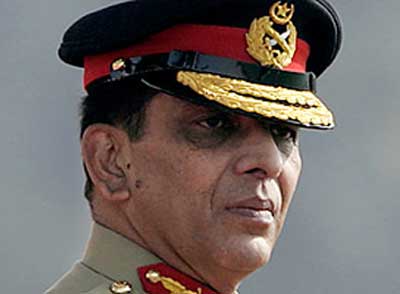
As requested by the Supreme Court, both the Army Chief, Ashfaq Parvez Kayani, and the Director-General of the ISI, Lieutenant-General Ahmad Shuja Pasha, submitted replies to the judicial committee. Prime Minister Gilani responded to the army and security chiefs’ actions by stating that they had acted, “unconstitutionally” by not first receiving authorization from the Defence Ministry. Gilani followed up on his comments by firing the country’s Defence Minister, retired Lieutenant-General Naeem Khalid Lodhi, accusing him of, “gross misconduct and illegal action which created misunderstanding” between state institutions. Lodhi is seen as having tight links to the military establishment’s high command and was replaced with a Gilani ally, Nargis Sethi, who is also currently the Cabinet Secretary.
This move was seen as extremely volatile, given the fact that the last time a defence minister was sacked it resulted in the country’s fourth coup and the coming to power of General Pervez Musharraf. The army’s response to the sacking of Lodhi, stated Gilani’s move has, “very serious ramifications with potentially grievous consequences for the country.” In response to these threats by the military, the PPP’s coalition partner the Awami National Party, put forward a resolution in the National Assembly on 13 January seeking support for “efforts made by the political leadership for strengthening democracy,” and called for “full confidence and trust” in the country’s leadership. The resolution was passed in what was labeled a “vote for democracy,” with two-thirds majority in the 342 member parliament. The question then becomes isPakistan facing a looming military coup after less than five years of civilian rule? Many analysts point to a variety of issues regarding the complex internal situation inPakistan as reason for why civilian rule will continue in the foreseeable future.
It must be noted that the judicial and military alignment against the PPPs is not a planned maneuver to besiege the democratically elected government. Rather, it is a case of “my enemy’s enemy is my friend.” Given the mutually hostile relationship between the Supreme Court and the military under the rule of General Pervez Musharraf, neither institution is keen to cozy up to the other.
Opposition Parties Align Against the PPP
Against the backdrop of a high profile conflict between Pakistan’s strongest political players, opposition groups in parliament have begun to pressure Zardari and the PPP. On 13 February, oppositional parties met with the most important non-PPP parliamentary member Nawaz Sharif of the Pakistan Muslim League-Nawaz. In this meeting the opposition leaders discussed three options to deal with the PPP government, they included: a non-trust motion against the government, a long march or street agitation, and en bloc resignation from parliament. While sources believe that a non-trust motion was quickly shot down due to the fact that it would likely not pass, the other options remain on the table. Although these players are happy to see both the military and Supreme Court putting pressure on the PPP, they stressed “the need for strengthening the democratic system and decided to oppose any extra-constitutional step to oust the government.”
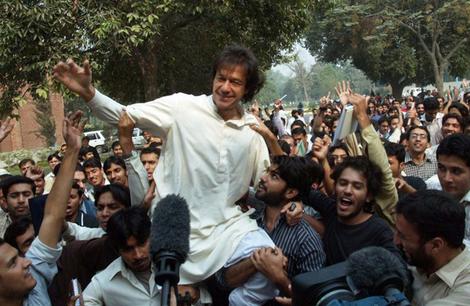
Mr. Sharif views an earlier election as extremely necessary due to the fact that the Movement for Justice party’s Imran Khan, a former cricket star, has become widely popular in the last two months, taking away from the former prime minister’s power base. As Khan is purportedly tied to the military establishment and the ISI, an election which would result either in a victory for the former cricketer, or a weak coalition government consisting of the now oppositional parties, would be a victory for the country’s top military brass. Analysts believe that any compromise between the governing party and opposition groups would involve parliamentary polls earlier than March 2013 (when they are scheduled) in return for allowing Senate elections on 2 March of this year, which the PPP is projected to win. According to most experts, this outcome is the mostly likely resolution to the current Pakistani crisis.
Why There Will Not be a Coup in Pakistan
The current crisis is not 1958, 1977, or 1999, all years in which civilian Pakistani governments fell to hostile takeovers by the military. A variety of factors are ensuring that the military wants no hand in ruling the country directly. The armed forces are fighting two insurgencies in the western part of the country, one against the Pakistani Taliban in the country’s North-West Tribal Region, the other, a smaller insurgency consisting of Baloch independence fighters in the country’s southwest. These two conflicts ensure that the country’s armed forces have their hands full. Embattled on two fronts, the military does not want to risk being pulled into the political realm due to its heavy reliance on public support to conduct intelligence operations against internal security threats.
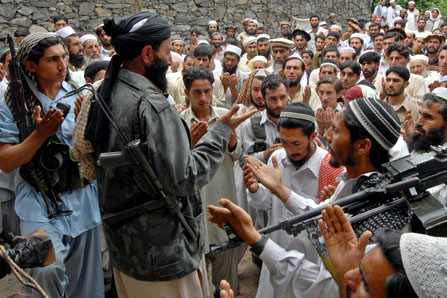
Exposing itself to the ups and downs of ruling the country directly would surely damage the military’s credibility. This fact is most pertinent due to the decrepit state of Pakistan’s economy, characterized by shortages of electricity, gas and water, with food inflation at an annual rate of 20%. Thus, the generals believe that it would be much more difficult to acquire international financial assistance in the aftermath of a military coup, and would much rather have civilians representing the nation in the international realm. In addition, the military’s inability to stop American troops from entering its airspace and killing Osama bin Laden severely damaged its credibility in the eyes of the Pakistani public. The military, always the pragmatic player, also realizes that its previous attempt to rule the country under General Pervaz Musharraf was widely unpopular and resulted in a strong push by Pakistani civil society towards democratic rule. Furthermore, the generals have gauged the international atmosphere, and by looking at its Muslim neighbors to the west who are embroiled in the Arab Spring, has noticed that autocratic government is currently not en vogue. Thus, with the PPP facing pressure from both the Supreme Court and oppositional parties, it seems that the Pakistani military will opt for a “soft coup.” This would entail letting the current political situation run its course, hoping that either the Supreme Court, through an impeachment procedure, or the opposition parties, in an electoral victory, will oust the government in the coming months.
Further Reading
What’s Behind the Furor in Pakistan? ; Timeline: Pakistan’s Memogate ; Memogate: Pakistan’s Evolving Politics ; Is Pakistan Facing a Military Coup? ; Why Pakistan’s Zardari Will Not Fall to A Military Coup ; Pakistan Court to Examine Zardari’s Immunity ; Balochistan Insurgency ; Pakistan’s Broken Economy ; Pakistan on the Edge
Disclaimer: Any views or opinions expressed in this newsletter are solely those of the authors and the news agencies and do not necessarily represent those of the NATO Council of Canada. This newsletter is published for information purposes only.

